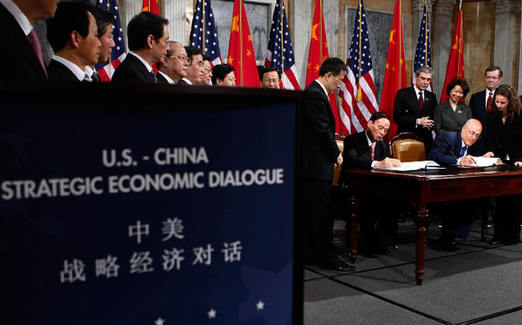|
The China-U.S. Strategic and Economic Dialogue
The Insider View of a Former Ambassador
By staff reporter HOU RUILI
ZHOU Wenzhong took up the post of China's ambassador to the United States in 2005 and soon after that preparatory work began for the launch of the China-U. S. Strategic Economic Dialogue. During his five years in the post the ambassador witnessed the evolution and development of this dialogue. Now, the China-U.S. Strategic and Economic Dialogue (S&ED) has become an important platform to promote Sino-American relations in a new era. On the eve of the third round of the China-U. S. Strategic and Economic Dialogue, taking place in the U.S. in May 2011, China Today interviewed former ambassador Zhou Wenzhong.
 |
|
The fourth round of U.S.-China Strategic Economic Dialogue came to a successful close in Annapolis on June 18, 2008. China Foto Press |
A High-level Dialogue Mechanism
The China-U.S. Strategic Economic Dialogue started in 2006, but when President Barack Obama came to office in 2009 this mechanism was merged with the China-U. S. Strategic Dialogue to form the China-U. S. Strategic and Economic Dialogue.
In July 2006 Zhou Yongkang, then State Councilor and Minister of Public Security, visited the United States and held talks with the U.S. Department of Justice, the Federal Bureau of Investigation, and the White House Office of National Drug Control Policy. At that time, Henry Paulson was taking over from John Snow as Treasury Secretary, and said he wanted to meet with Zhou Yongkang. The ambassador was puzzled as to why a U.S. treasury secretary should wish to meet a Chinese leader in charge of political and legal affairs.
When the two did meet Paulson got straight to the point: "President Bush has authorized me to handle U.S.-China economic relations on behalf of the American government." He suggested that the two governments conduct strategic dialogues on the issues of economy and trade. It was Paulson's view that many problems existed in bilateral relations in these dimensions. The China-U.S. Joint Commission on Commerce and Trade (JCCT) was cooperative, but many problems lay beyond its scope, and so another mechanism was needed to handle them.
"Paulson being authorized by the White House to conduct such a dialogue on behalf of the U.S. president was a significant matter. We reported this to the central authorities and their reply was not long coming," recalled Zhou Wenzhong, "then China accepted the suggestion and appointed Comrade Wu Yi as the special representative of President Hu Jintao to preside over the China-U.S. Strategic Economic Dialogue."
From December 2006 to December 2008, five sessions of the China-U.S. Strategic Economic Dialogue took place. According to Zhou, the participants at the first dialogue were real heavyweights. The American delegation was headed by Paulson, special representative of the U.S. president and treasury secretary, and the members included commerce secretary, chief negotiator of trade, labor secretary, president of the U.S. Export-Import Bank, deputy secretary of state, and chairman of the Federal Reserve Board. Vice-premier Madame Wu Yi, the special representative of President Hu Jintao, headed the Chinese delegation, which included the finance minister, commerce minister, deputy minister of foreign affairs, director-general of the development and reform commission, chairman of China Insurance Regulatory Commission, chairman of China Banking Regulatory Commission, chairman of China Securities Regulatory Commission, and governor of the People's Bank of China. The high-level nature of the dialogue drew close attention worldwide.
|
